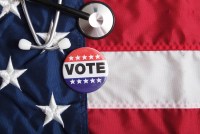Latest KFF Health News Stories
Paid Sick Leave Sticks After Many Pandemic Protections Vanish
The U.S. is one of nine countries that do not guarantee paid sick leave. Since the covid pandemic, advocates in states including Missouri, Alaska, and Nebraska are organizing to take the issue to voters with ballot initiatives this November.
A casi tres meses del tiroteo en el desfile del Super Bowl de los Kansas City Chiefs, que dejó al menos 24 personas heridas, recuperarse de esas heridas es algo profundamente personal e incluye una sorprendente área gris de la medicina: si las balas deberían o no extraerse.
Three People Shot at Super Bowl Parade Grapple With Bullets Left in Their Bodies
Despite the rise of gun violence in America, few medical guidelines exist on removing bullets from survivors’ bodies. In the second installment of our series “The Injured,” we meet three people shot at the Kansas City Super Bowl parade who are dealing with the bullets inside them in different ways.
Paris Hilton Backs California Bill Requiring Sunshine on ‘Troubled Teen Industry’
Celebrity hotel heiress Paris Hilton is expanding her campaign for more public reporting on residential therapeutic centers’ use of restraints and seclusion rooms in disciplining teens, setting her sights on legislation in Sacramento and Washington, D.C.
Los hirieron en el desfile del Super Bowl: un mes después se sienten olvidados
Durante el primer mes, los líderes comunitarios de Kansas City han discutido cómo atender a las personas que quedaron atrapadas bajo el fuego cruzado y cómo distribuir los más de $2 millones donados a los fondos públicos para las víctimas bajo el doloroso impacto inicial.
As money flows to abortion rights initiatives in states, some donors focus on where anger over the “Dobbs” ruling could propel voter turnout and spur Democratic victories up and down the ballot, including in key Senate races and the White House.
They Were Injured at the Super Bowl Parade. A Month Later, They Feel Forgotten.
In the first of our series “The Injured,” a Kansas family remembers Valentine’s Day as the beginning of panic attacks, life-altering trauma, and waking to nightmares of gunfire. Thrown into the spotlight by the shootings, they wonder how they will recover.
Why Even Public Health Experts Have Limited Insight Into Stopping Gun Violence in America
After the 1996 Dickey Amendment halted federal spending on research into firearms risks, a small group of academics pressed on, with little money or political support, to document the nation’s growing gun violence problem and start to understand what can be done to curb the public health crisis.
America Worries About Health Costs — And Voters Want to Hear From Biden and Republicans
The presidential election is likely to turn on the simple question of whether Americans want Donald Trump back in the White House. But health care tops the list of household financial worries for adults from both parties.
Without Medicare Part B’s Shield, Patient’s Family Owes $81,000 for a Single Air-Ambulance Flight
Sky-high bills from air-ambulance providers have sparked complaints and federal action in recent years. But a rural Tennessee resident fell through the cracks of billing protections — and a single helicopter ride could cost much of her estate’s value.
States Get in on the Prior Authorization Crackdown
Last month, my colleague Lauren Sausser told you about the Biden administration’s crackdown on insurance plans’ prior authorization policies, with new rules for certain health plans participating in federal programs such as Medicare Advantage or the Affordable Care Act marketplace. States are getting in on the action, too. Prior authorization, sometimes called pre-certification, requires patients […]
States Target Health Insurers’ ‘Prior Authorization’ Red Tape
Doctors, patients, and hospitals have railed for years about the prior authorization processes that health insurers use to decide whether they’ll pay for patients’ drugs or medical procedures. The Biden administration announced a crackdown in January, but some state lawmakers are looking to go further.
Federal Program to Save Rural Hospitals Feels ‘Growing Pains’
Fewer than two dozen rural hospitals were converted into Rural Emergency Hospitals in the program’s first year. Now, advocates and lawmakers say tweaks to the law are necessary to lure more takers and keep health care in rural communities.
Hoping to Clear the Air in Casinos, Workers Seek to Ban Tobacco Smoke
Casinos in several states are fighting efforts to ban smoking, and trying to roll back existing anti-smoking laws. One planned facility even moved outside a city’s limits because of voter-approved smoking restrictions.
Rising Malpractice Premiums Price Small Clinics Out of Gender-Affirming Care for Minors
Even in states where laws protect minors’ access to gender-affirming care, malpractice insurance premiums are keeping small and independent clinics from treating patients.
Child Care Gaps in Rural America Threaten to Undercut Small Communities
Deep gaps in rural America’s child care system threaten communities’ stability by shrinking the workforce and inhibiting economic potential. Now that pandemic-era federal aid for child care programs and low-income families has ended, it’s up to state and local leaders to find solutions.
Deep Flaws in FDA Oversight of Medical Devices, and Patient Harm, Exposed in Lawsuits and Records
Thousands of medical devices are sold, and even implanted, with no safety tests.
‘Financial Ruin Is Baked Into the System’: Readers on the Costs of Long-Term Care
Thousands of people shared their experiences and related to the financial drain on families portrayed in the “Dying Broke” series, a joint project by KFF Health News and The New York Times that examined the costs of long-term care.
Journalists Delve Into Gun Violence, Medicaid’s ‘Unwinding,’ Opioid Lawsuits, and More
KFF Health News and California Healthline staffers made the rounds on national and local media this week to discuss their stories. Here’s a collection of their appearances.
El daño colateral de la crisis de Medicaid: miles están perdiendo beneficios de alimentos
Las familias de bajos ingresos que necesitan servicios como ayuda alimentaria y dinero en efectivo, se ven afectadas por la carrera burocrática para determinar si decenas de millones de personas aún califican para Medicaid.
























